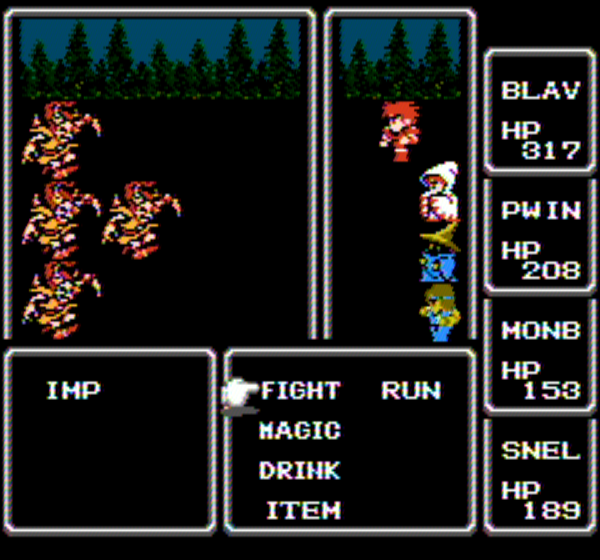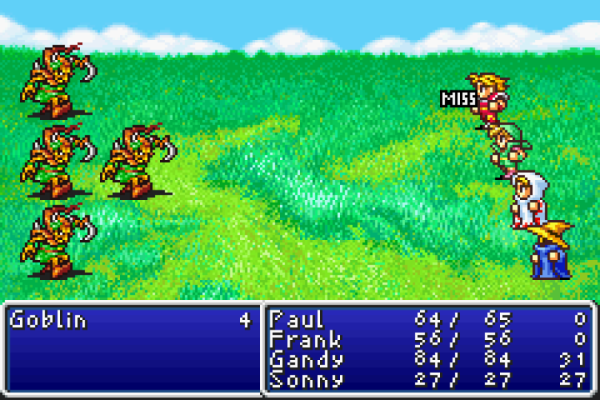Note: this is reposted from an old blog that I was working on shortly before creating Zonelets!
I'm working on an old school JRPG in OHRRPGCE and I decided to check out the original Final Fantasy for fun and research. So far, I just re-sparkled the first of 4 ORBs. Growing up, I thought of the Playstation era as peak FF, although at this point I've also played some or all of 4,6,10, and 13.
I've been trying to abide by the limitations that I think will create the most interesting experience for me, while skipping over tedium that would get me to check out entirely. Here are some notes about my play experience.
Anachronous decisions:
- Speeding up gameplay using emulator turbo button. It's not ideal because the music speeds up and it breaks the game's rhythm. Future editions do stuff like add a dash button which I think is a pretty harmless upgrade. In some ways I feel like this game would work well as a Gameboy game or something because a lot of the spaces seem like they were made strangely large just to control what the player can/can't see given the number of tiles that the NES can show on-screen. I also wish you could do things like buy multiple healing items at once (especially since I go through these like water).
- Rewind time. Mesen allows you to go back to earlier points in your play session. I prefer this to using lots of save slots pre-emptively because it's less disruptive to the game's rhythm. But if there's a setback that's too demoralizing then I can still just… pretend it never happened ;)
- Using guides for info on spells and equipment. The NES version of the game has tons of bugs in the spells that cause them to not work or not make sense. And it's a logistical nightmare trying to understand the weapons and armor from in-game info due to the inconvenient menus.
Synchronous decisions:

- Original NES version. My thinking is that I'm interested in the game as an intentional object created under certain circumstances with certain goals. From a graphics standpoint, the PS1 and GBA remakes both feel strange to me. Devoid of context, they are appealing enough, with the GBA graphics being particularly round and cute in a way that I probably would have preferred as a kid. But they really bring a different energy, casting a sort of lush cartoon finish on the game. Which feels very incongruous to the game's sparse and tense structure. The original sprites are quite frankly scary, bristling with scratchy, ambiguous detail. The backgrounds evoke their physical locations with small and surprisingly beautiful strips of art, but the battle screen is an abstraction, a menu, first and foremost. So much of this game lives in your mind, and the heavy abstraction supports this. I'm often shocked and relieved when I beat bosses on the first or second try, because the game has so successfully built up tension. I can't help but think that prettifying the game would make it feel more boring and empty, because it's priming your brain for the wrong type of experience.

- Additionally, the GBA version changes the magic system from the DnD-style level-based spell slots of the original to a shared MP pool like later FF games. It's a similar move to the graphical changes in that it smooths and modernizes the systems in ways I find incongruous. I was actually really enjoying how the spell slots system diminishes the problem that later FF games have where early game spells are rendered almost completely obsolete. By having reserved slots for low-level spells, you can use them "guilt free" because they don't take the same resource as your powerful newer abilities.
- Another old-timey aspect is the fact that attacks don't automatically retarget if an enemy dies (so a character's turn might be wasted). You really have to be intentional about who's attacking who and make a lot more calculated risks for the sake of efficiency. A lot of people consider this essentially "outdated" and objectively bad, but I think it works here. The battle system is simple enough that it's a big part of what makes you pay attention and feel invested in your dice rolls.
- Avoiding external dungeon maps. Much of the drama comes from the guesses, hopes, disappointments, and relief that happens as you navigate the maps. I don't think that using walkthroughs in general is "bad". But there's kind of just not much left over to experience if you do that here, and it's worth attempting to trust that this game will create interesting drama out of your ignorance.
Overall Impressions:
I feel like I've learned a lot from playing this game! The spell structure, the map design, the art, and the battle design all work together really beautifully to create cool little stories. That said, I do feel like there are some big issues with the design thus far. Whenever I'm not explicitly grinding, I find that it's preferable to run from pretty much every fight that you can. As far as I can tell, it's simply not worth it to kill enemies when you're trying to explore or defeat a boss. So it feels weird and inconvenient to spend such a large proportion of the playtime selecting "run" with each character and hoping to get away. I do like how deadly the dungeons are overall, though. They are really spooky and it's beneficial to take the bigger ones in multiple goes. First, you scan for treasure and the staircase to the next floor, then you might return to the surface to save your haul and restore your spell slots at the inn. On the next trip you can beeline to the staircase (if you remember where it is correctly) and keep it going. But yeah maybe it would work better if 1) escaping was less effective, 2) slightly fewer encounters, 3) slightly easier encounters. So the balance shifted a bit more in favor of fighting instead of fleeing, without overwhelming the player in repetition and a feeling of wasted resources.
I think I might be ready to quit though. Although I thought that earlier and I came back to the game. There's something so meaty to the core of this game. It may be simple and there are some actions that are tedious to repeat over and over (I tried but failed to make a macro that would select "run" for all characters) and yet it's really satisfying to make progress! We'll see…
Misc.
Some other notes I want to jot down but not fully write out in essay form:
- I like that the enemy formations are quite varied in difficulty and that running can often be really important for survival. As opposed to a more linear later FF where you'd expect all the encounters to be reasonably balanced to your level in a given area. It's a different concept of balance that makes the world feel alive.
- The money is balanced in a cool way where stuff feels really expensive but also you feel well-compensated by fighting hard enemies and it's exciting to see certain enemies because you know they'll drop a hefty chunk of change.
- It's neat how towns are kinda formulaic but also feel like they have different "stats" in that some are missing item shops or priests, some have better magic than others, etc. You end up returning to old towns which is cool, it doesn't feel like you're just sort of consuming and forgetting them in sequence.
- The funniest part was when you fight the (pretty easy) pirates who are terrorizing a town and then the captain is like "lol you got me, take my ship"